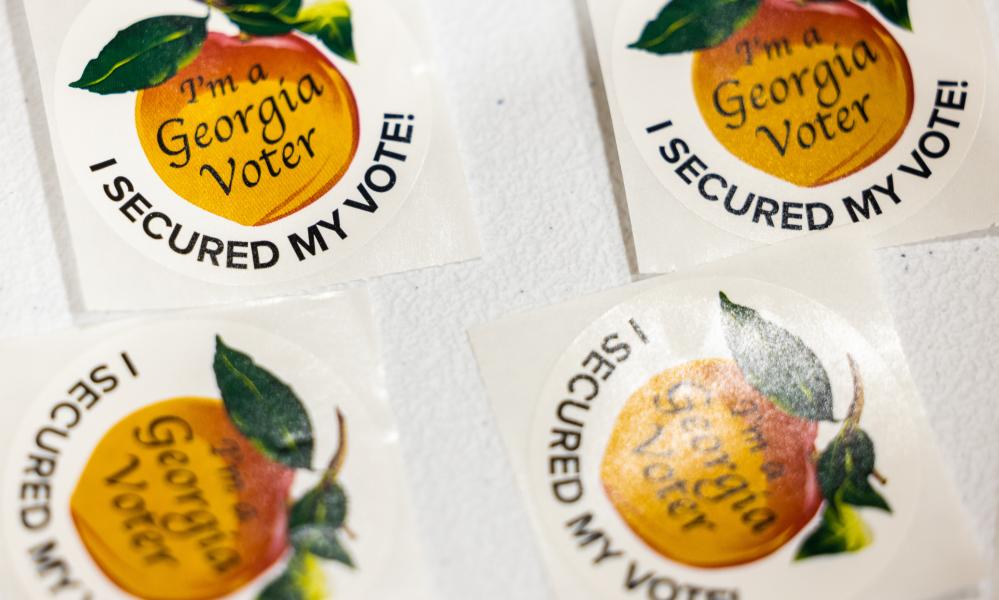

Taxes. Vaccinations. Chickens.
Republican party leaders in Catoosa county, in the north-west corner of Georgia, ran prospective GOP candidates through a battery of ideological questions, permitting some to run in the party primary while denying others.
Local political purity tests have been discussed by both Republican and Democratic party officials for years, but this is the first time a county’s political body has actually attempted the feat.
Related: Fani Willis and Judge Scott McAfee draw challengers in Fulton county primary
Perhaps that’s because of the punishing backlash now facing the six executive committee members of the Catoosa county Republican party after a lawsuit from disqualified candidates: fines of $1,000 an hour, times four for the number of Republican candidates the county’s GOP body refused to put on the ballot, times six for each of the executive committee members. That’s $24,000 an hour for the whole group until they comply with a judge’s order to put the candidates on the ballot.
“The criteria they’re using is how we vote in the commission meetings,” said Vanita Hullander, a Catoosa county commissioner initially barred by the county’s GOP leaders from running for re-election as a Republican in the 14 May primary. “They’re very manipulative, and they’ve been trying to take control of the commission for a long time.”
Hullander is a lifelong conservative Republican, she said. But after the county party’s executive committee questioned her about votes on local tax increases, vaccination requirements and a contentious local ordinance governing where and how residents may keep chickens on their property, it declared it would not allow her on the Republican ballot line. The group also barred three others.
Others, like Jimmy Gray, a candidate for commissioner, were not barred. Notably, Gray’s stepmother, Regina Gray, is chairwoman of the Graysville precinct of the county’s party.
The disqualifications would have left only one person running for the chairperson’s seat: Nick Ware, a perennial candidate with hard libertarian views.
“This is my opinion: a number of people on the committee … they’re really libertarians,” said Chuck Harris, a Catoosa county commissioner who is not up for re-election this cycle. He first learned of the leanings of the county’s Republican chair, Joanna Hildreth, when Hildreth was working with a candidate who needed signatures to make a libertarian run against Congresswoman Marjorie Taylor Greene. He said Hildreth asked the candidate, whom Harris didn’t name, to bad-mouth him to voters as she gathered those signatures.
“This was a month after I signed a loyalty oath in front of Hildreth for the party,” he said. “They’ll be coming for me next.”
The prospect of barring candidates for insufficient political fidelity has been raised by both parties at one point or another in Georgia and elsewhere. For example, North Carolina’s Democratic party is contending today with the state representative Tricia Cotham, who ran in an open Charlotte-area seat as a Democrat and then immediately switched parties to give Republicans a veto-proof supermajority.
But a county-level process runs a risk of ideological capture by political extremists who do not reflect the politics of most voters.
GOP county committee seats in Georgia are won in caucuses typically attended by no more than a few hundred voters in any given county every election cycle. (The Catoosa county Republican party happens to be holding its next county convention on 23 March.) Executive committee seats are then won by a vote of committee members. Republicans have about a five-to-one electoral advantage in Catoosa county. About 32,000 voters cast ballots in the county in 2020.
Hildreth, the county’s Republican chair, is also secretary of the Georgia Republican Assembly (GRA), a political action committee dominated by libertarians who have regularly been shut out of GOP party governance positions. The GRA’s chair is Alex Johnson, who has lost multiple races for Georgia GOP leadership positions. Johnson previously proposed a state party rule allowing party delegates to block candidates for statewide office on the basis of their fidelity to “Republican values”.
Johnson’s law partner, Catherine Bernard, is also Georgia’s national director for the National Federation of Republican Assemblies. The two of them are representing Catoosa county Republican party executive committee members in their defense against the lawsuit from the disqualified candidates.
Bernard did not return a call seeking comment. Hildreth asked for questions to be submitted by email, but has not yet replied.
In court Thursday, Hildreth was asked whether she would allow the candidates to be qualified to run for office, as ordered by the court. She said she would not and would instead appeal. Later that day the four candidates denied by the executive committee went to the party headquarters in the company of two Catoosa county sheriff’s deputies to sign qualification papers. Party members refused them entry.
The Catoosa county Republican party committee released a statement late on Friday.
“Draining the Swamp starts locally,” the statement reads, in part. “The Catoosa County Republican Party is fully run by Republican volunteers elected in a process open to Catoosa County voters. These grassroots citizens meet candidates, observe voting records, and work to ensure Republicans are elected to office. Catoosa County GOP is committed to ensuring that Catoosa County Republican candidates reflect the values of Catoosa County Republican voters.”
The order from the superior court judge Don Thompson of the Lookout Mountain judicial circuit noted that state law does not allow subjective criteria to be used to bar a candidate from a party’s ballot line. In court, Thompson said he had chosen not to jail the executive board members because he believed they had been led astray by bad advice, and suggested that they retain new counsel.
The clock on the fines started ticking at about 3.15pm on Thursday, and ended at noon Friday, after a judge ordered the county’s elections office to certify their qualification on the ballot directly. Collectively, the committee members have amassed fines just under $500,000.
“The rest of the state should be scared and nervous if a small, self-appointed group of people gets to decide who to vote for on a party-type election,” Harris said. “The primary is really the election, because if you don’t have a strong Democrat or independent challenger, you basically win your election at the primary.”
EMEA Tribune is not involved in this news article, it is taken from our partners and or from the News Agencies. Copyright and Credit go to the News Agencies, email [email protected] Follow our WhatsApp verified Channel









